The loss of a pregnancy or infant is a devastating, life-altering experience. It is defined as the loss of a baby before, during, or after birth through miscarriage, stillbirth, SIDS, or other causes. It is estimated that pregnancy and infant loss impacts 1 million women per year in the United States.
Complex Grief
The grief associated with pregnancy and infant loss is complex in that it encompasses a multitude of losses ~ loss of hopes, dreams, and the future as you planned it. The holistic impact of these losses is powerful. Grief touches a person physically, emotionally, cognitively, socially, and spiritually. How does one begin to navigate through their grief when it is all-consuming?
Grief looks and feels different for everyone. There is no timeline for grief, no right or wrong way to grieve. Men and women often experience grief differently and question how to support each other’s needs. There are some consistent feelings and responses that many women/couples experiencing a loss can relate to including feelings of deep sadness, emptiness, anger, fear, and shame. Those impacted by pregnancy or infant loss are often showered with love and support early in their journey. However, as support fades and life continues on for others, they begin to feel alone and isolated, questioning how to reintegrate back into the world as they previously knew it.
Many are often haunted by the question of “why” they lost their pregnancy, or their baby died, and doctors do not always have an answer. This “not knowing” fuels ongoing introspection and evaluation of circumstances that elicit unique grief reactions in women (and couples). While those grieving are told by providers, “This is not your fault, nothing you did or didn’t do caused this, there is nothing you could have done differently”, women who have lost a pregnancy or infant consistently identify feelings of intense guilt and shame, a sense of their body failing them, or a sense of being responsible for and failing their baby.
Processing these complex emotions is essential as one begins to embark on a journey of healing. Learning to cope with the pain, accepting the reality of your loss, and readjusting to the world are tasks of mourning and healing.
Healing After Loss
Establishing a community of support is useful as you learn to live with your grief, in the early days or years later. Consider connecting with others who have experienced a similar loss and walked in your shoes, through pregnancy and infant loss support groups. Participate in a special event or memorial walk, often hosted by non-profit organizations in the month of October. Engage in rituals that can be established to remember your pregnancy or baby, to honor your loss, or to symbolize important milestones, anniversaries, or holidays.
Therapists who specialize in pregnancy and infant loss are also available to help guide and support you through your grief and healing. A therapist can help to navigate and process your emotions, establish rituals, manage family dynamics or boundaries, explore the future, and find happiness again. A therapist can be especially useful if you feel stuck in your grief, experience complicated grief, or develop symptoms of depression, anxiety, or post-traumatic stress syndrome. You do not have to suffer alone. There is a community of support available to you.


